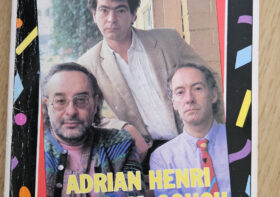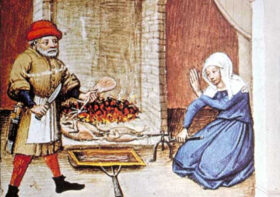Getting poetry out there

 As I sit down with a cup of tea in my favourite mug (pictured above – just an excuse to feature it, really! I inherited it from my mum, it used to be one of pair but the other got broken, and I’m so attached to this one I dread anything happening to it. It’s not as if I’m a raving royalist but I love the kitsch of it, so wonderfully lacking in irony, plus there’s just something touching about this reminder of Charles and Di in their youth, before all that stuff happened…) erm, where was I?
As I sit down with a cup of tea in my favourite mug (pictured above – just an excuse to feature it, really! I inherited it from my mum, it used to be one of pair but the other got broken, and I’m so attached to this one I dread anything happening to it. It’s not as if I’m a raving royalist but I love the kitsch of it, so wonderfully lacking in irony, plus there’s just something touching about this reminder of Charles and Di in their youth, before all that stuff happened…) erm, where was I?
Anyway, I was just thinking about my fellow book group members who I’ll be seeing tonight, and how popular book groups seem to be, and why more people don’t read poetry .. the perennial question! I was also thinking of a conversation I had earlier this week with Margaret Wilmot about her new pamphlet, published by the highly respected Michael Laskey at Smith’s Knoll, and the challenge of distribution and sales. I was also thinking of a blog post I read yesterday at Rack Press Poetry about Amazon listing pamphlets as ‘unavailable’ when they actually are (but not from Amazon).
There is so much intelligent debate around the issue of how to get more people reading and buying poetry. I enjoyed this recent post by Judi Sutherland, for example, and her ideas of what she would do if she were the ‘marketing manager for UK Poetry plc’.
Of course, the distribution issue is classic chicken-and-egg. Bookshops won’t stock poetry from publishers or authors they’ve never heard of – not just because they fear they won’t sell (they can always send them back) but because the valuable retail space they would occupy is more profitably allocated to yet more copies of the latest E L James or whatever. So bookshop browsers never come across any poetry books, don’t know even the names of any poets and therefore are never going to ask for poetry or poets.
I know this argument well, from my experience in the sports industry. In the 1990s, UK sports retailers were notoriously male-sport-oriented. Independent stores in particular were owned and managed by men. They refused to stock a decent range of women’s sports shoes, their argument being that ‘women won’t pay more than £30 for a paid of trainers’ or even that ‘women buy kids trainers because they go up to their size and are cheaper.’ It didn’t seem to occur to them that women were only buying those products because they had no choice, and didn’t know what else was available. Retailers wouldn’t take the risk, didn’t understand what female customers wanted and didn’t care about the product except in terms of SKUs (stock keeping units) and getting the highest turnover per-square-foot.
Getting retailers to stock women’s sports shoes took an awful lot of work: sales reps had to be educated and incentivised, demand had to be generated and demonstrated, point-of-sale material had to be funded together with other shared-risk schemes and special conditions, favours had to be called in. The manufacturer had to put their shoes on high-profile female athletes and use them in advertising. All before retailers would take a chance on women’s shoes. And we’re not talking about a tiny shoe manufacturer that the retailer had never heard of. This was Nike. (You may think things aren’t much different today but trust me, it’s better than it was.)
I don’t see how it can be any easier for a publishing niche such as poetry, especially considering the tragic state of retail in general right now. The excellent Inpress appears to do a great job on behalf of independent presses, getting poetry books into bookshops. But in general, retail does not take risks, and if I ever have a pamphlet to sell I won’t hold my breath for Waterstones or Foyles to stock it.
So can anything be done to stimulate demand? I think we have to devise more ways to get poetry onto the radar of what Judi Sutherland calls the ‘nearly theres’. I’ve always loved Poems on the Underground, for example. I’m not so keen on the watering down of poetry by harnessing it to something else ‘more popular’, such as bringing out a poet or two at a music festival. I worry that it may reinforce the association between poetry and song lyrics, when it would be nice to see them have an argument occasionally. But maybe that’s just me.
Perhaps all of us who are in a book group should introduce a volume of poetry when it’s our turn to choose, rather than a novel. Perhaps we can help get poetry into more public spaces – shop windows, noticeboards, on the backs of bar menus, on buses, on mugs. Perhaps we should think like old-style ‘interruption’ advertisers. A poetry short in place of one of those endless trailers before a film. How about some guerrilla poems left around town on tables or in shops – the knitters and crochet people do this very well! We need more (some!) poetry on TV – come on, film-makers, I can think of half a dozen ideas for a compelling poetry-themed programme.
OK my tea’s cold now, so rant over. Let me know your thoughts. Have we really tried everything? Is poetry destined to be forever a teeny drop in the publishing ocean?



Thought provoking. I enjoyed reading Judi Sutherland’s blog too. Interestingly, I decided to read one of my poems to a couple of colleagues at work the other day. I have no idea whether they like poetry or not., I simply needed an audience to help me decide if my poem was finished or not and they were available. Also, it was about me coming out of the closet and being the person I am. My colleagues said they liked my poem. Maybe I need to do more of this…. and maybe you need to make poetry the latest ‘must have’ accessory!
Great idea Kathy – just casually coming out with a poem like that! No apologies or big build-up, just matter-of-fact ‘what do you think, is it finished?’ Also gives your colleagues a sense of ownership, your asking their opinion, which draws them in whether they like it or not. I think I will try this, rather than treating poetry as a bit unmentionable, which is what I’m guilty of in non-poet company.
Good post. Thanks. Coincidentally I came across this article today; maybe poets could help restaurants make poem-menus/ menu-poems: http://blog.pshares.org/index.php/found-poetry-101-the-restaurant-menu/?utm_source=Copy+of+Poetry+June+12%2C+2013&utm_campaign=Poetry+Matters+June+19&utm_medium=email
But you got me thinking about the whole idea of broadsides and the possibilities of such things. Googled and came across this attractively done recent article –
http://www.thevolta.org/ewc29-kschlesinger-p1.html
Now I want to start leaving broadsides in unexpected places 🙂 But also I must try hard NEVER to buy a greeting card again.
Actually, I learned about the “mail art” movement recently which is designed to share around visual art, in the mail, with other artists adding to it. Poetic text , of course, could easily be a part of such a thing.
Yes, indeed… lots to ponder.
Hi Elly, MANY thanks for those fantastic links – the menu found poetry is great fun, and the Schlesinger article is a real gem. I love the look of those letterpress broadsides. It’s making me think of handing out poetry to unsuspecting passers-by at the local farmers’ market, or at football matches. Fantastic. Mail art? That DOES sound like fun. We could get it sponsored by Royal Mail in this country, they are desperate for the business. 🙂
Hi Robin, as you know, I’m doing my bit to raise poetry’s profile with a dedicated poetry blog which receives around 100 views a day – not mind-blowing but certainly proving that there is an appetite for poetry (www.andotherpoems.wordpress.com for anyone who’s interested). There are some poetry projects around on KickStarter and it will be interesting to see how they fare. Unless projects have proper funding, their remit will never be wide enough to make a lasting impact. I have lots of ideas but no money!
Hi Josephine, yes! Your blog is wonderful and congratulations on getting such high page views. Money. Hmm! Yes, but it could work from both directions – top-down (money) and bottom-up (grassroots/low budget). Sustainability is key I guess. Long-termism, not short one-off projects, which is what arts funding (if you can find any) ever seems to be for. There must be some potential philanthropists out there – I’ll check out those Kickstarter projects, would be interesting to see what other people are proposing. Thanks!
Thanks for the link, Robin. Loved your analogy with sports shoes! Nobody’s going to make stuff that they think won’t sell, but if it’s not available them of course it won’t sell! Somebody has to take a calculated risk. The rise of creative writing courses has meant that there is a huge “supply side” for poetry, and much of it is very good quality. But there is no “demand side” to the poetry economy, and the only solution to that is marketing, in it’s broadest sense, including exposing people to poetry and educating them into appreciating it. HOW we can do that is a whole other question.
Ooh yes don’t get me (re)started. The lamentable lack of interest in poetry by teachers is one problem I think. Ignorance breeds ignorance. Maybe a poetry hit squad needs to travel the country and seriously persuade teachers of all subjects to open their eyes & minds. Legitimate use of force would be OK I think! You can’t force people to get it but look what the Alpha Course has done for organised religion at a time when the church of England is on its knees. Poetry needs its own version of that.